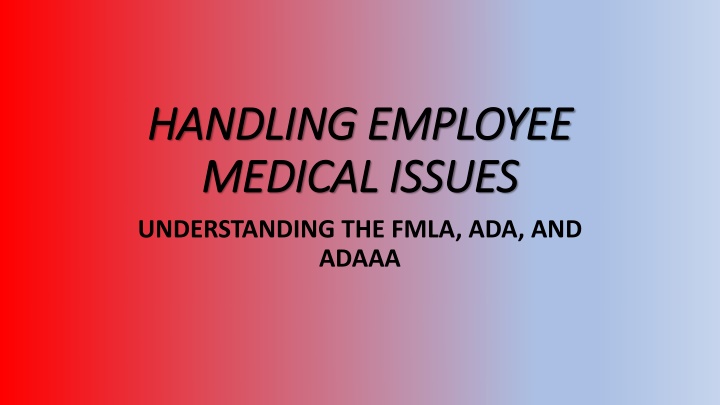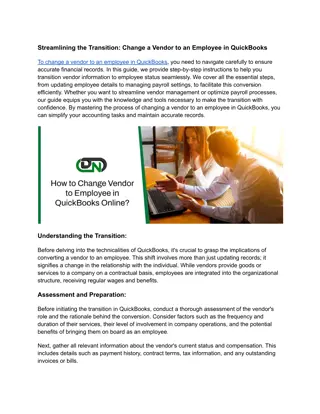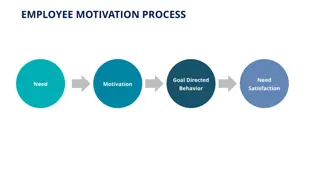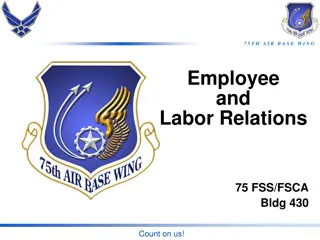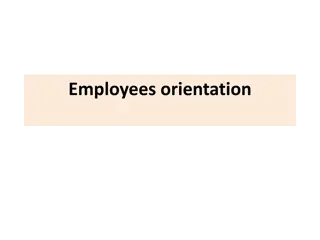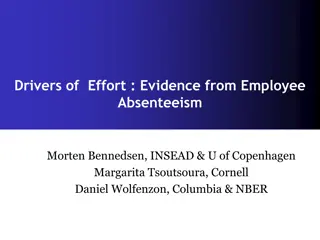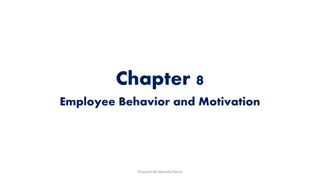HANDLING EMPLOYEE MEDICAL ISSUES
The Family and Medical Leave Act (FMLA) provides eligible employees with up to 12 weeks of job-protected unpaid leave for specific family and medical reasons. Learn about eligibility criteria, leave allowances, how leave can be taken, and when FMLA leave can be utilized for various circumstances.
Download Presentation

Please find below an Image/Link to download the presentation.
The content on the website is provided AS IS for your information and personal use only. It may not be sold, licensed, or shared on other websites without obtaining consent from the author.If you encounter any issues during the download, it is possible that the publisher has removed the file from their server.
You are allowed to download the files provided on this website for personal or commercial use, subject to the condition that they are used lawfully. All files are the property of their respective owners.
The content on the website is provided AS IS for your information and personal use only. It may not be sold, licensed, or shared on other websites without obtaining consent from the author.
E N D
Presentation Transcript
HANDLING EMPLOYEE HANDLING EMPLOYEE MEDICAL ISSUES MEDICAL ISSUES UNDERSTANDING THE FMLA, ADA, AND ADAAA
THE FAMILY AND MEDICAL LEAVE ACT THE FAMILY AND MEDICAL LEAVE ACT ( FMLA ). ( FMLA ). What is it? What is it? The FMLA applies to companies with 50 or more employees, as well as all public agencies and public and private elementary and secondary schools. A type of leave that allows eligible employees to take up to twelve (12) workweeks of job-protected unpaid leave for specified family and medical reasons during a twelve (12) month period.
When is an employee eligible for FMLA leave? You must have worked for the employer for at least 12 months and for at least 1,250 hours during the year preceding the start of the leave. Neither paid nor unpaid leave are counted towards hours worked. Instead, only hours that are actually worked are utilized to calculate hours of service in order to determine eligibility for FMLA leave. You must not have used all available FMLA leave in the twelve (12) months preceding the date on which your requested leave is to begin.
HOW MUCH LEAVE IS AN EMPLOYEE ALLOWED UNDER FMLA? An employee may take up to 12 workweeks in a 12- month period beginning with the first day leave is taken. An absence for FMLA leave is not an occurrence for purposes of the employer s attendance policy.
HOW CAN LEAVE BE TAKEN? Leave can be taken consecutively (i.e., all at once), or intermittently (i.e., in increments) depending on the circumstances. With respect to intermittent leave, employees can take intermittent leave for serious health conditions (either their own or covered family members) or, if allowed by the employer, for child care after the birth of a child or the placement of an adopted or foster child. When scheduling planned medical treatments, employees must consult with the employer and make a reasonable effort to schedule treatments so as not to unduly disrupt the employer s operations, subject to the approval of the employee s health care provider.
WHEN CAN I TAKE LEAVE UNDER THE FMLA? to care for a newborn child to care for a child placed with the employee for adoption or foster care to care for your parent, spouse, son, or daughter with a serious health condition
WHEN CAN I TAKE LEAVE UNDER THE FMLA? because your own serious health condition makes you unable to perform the essential functions of your position. This includes any period of incapacity due to pregnancy, prenatal medical care or childbirth that makes you unable to perform one or more of the essential functions of your job.
WILL I BE PAID DURING FMLA LEAVE? FMLA leave is unpaid. However, if you have accrued leave time, you use that to get paid. Many FMLA leave policies require that you use all accrued time during FMLA leave. Check with HR if anything in contract provides additional benefits for union members
WHAT HAPPENS TO MY BENEFITS DURING LEAVE? Insurance benefits continue during FMLA leave on the same terms as if you had continued to work. If family member coverage is provided to you, it will be maintained during the FMLA leave. You must continue to make any normal contributions to the cost of the health insurance premiums.
WHAT HAPPENS WHEN FMLA LEAVE IS FINISHED? If the employee returns to work on or before the expiration of available FMLA leave, the employee will normally be returned to his or her former position or an equivalent job. If, however, the employee does not return prior to the expiration of FMLA leave, there is no guarantee of reinstatement.
CAN AN EMPLOYEE BE HIRED TEMPORARILY TO PERFORM YOUR JOB WHILE YOU ARE ON FMLA LEAVE? Yes. But when you return you must be restored to the same or similar position.
THE FAMILY AND MEDICAL LEAVE ACT Question: You are part of a same sex married couple and your significant other has a serious illness. You are his caregiver. Can you request leave pursuant to the FMLA to care for him?
THE FAMILY AND MEDICAL LEAVE ACT Answer: Yes. The term spouse was broadened to include same sex.
THE FAMILY AND MEDICAL LEAVE ACT Question: What about a domestic partner?
THE FAMILY AND MEDICAL LEAVE ACT Answer: No. The FMLA does not recognize a domestic partner as a family member who can avail himself or herself of the Act.
THE FAMILY AND MEDICAL LEAVE ACT Question: Can you request FMLA to care for a stepchild with a serious illness?
THE FAMILY AND MEDICAL LEAVE ACT Answer: Yes, child includes stepchild.
THE FAMILY AND MEDICAL LEAVE ACT Question: Can you request FMLA to care for a child with a serious illness over the age of 18?
THE FAMILY AND MEDICAL LEAVE ACT Answer: Yes, if the child is incapable of self-care because of a mental or physical disability at the time that FMLA leave is to commence.
THE FAMILY AND MEDICAL LEAVE ACT Question: Both my husband and I work for my employer. How much FMLA leave are we entitled to?
THE FAMILY AND MEDICAL LEAVE ACT Answer: 12 workweeks in any 12 month period.
THE FAMILY AND MEDICAL LEAVE ACT Montana works part-time for his employer. He has a medical condition (i.e., cancer), which has required for him to be out of work for significant periods of time. He is currently out on leave and has advised that he is unaware as to when he will be able to return as he has various pending medical treatments. Is the employer required to allow him to take FMLA leave?
THE FAMILY AND MEDICAL LEAVE ACT Answer: Only if he worked 1250 hours and is otherwise eligible.
A WORD ABOUT SICK LEAVE Federal law does not require sick leave. Sick leave is a benefit provided by the employer. It is paid leave unlike the FMLA which is unpaid. You accrue sick leave according to company policy. It is generally used for transient or short term illnesses like the cold or flu. Your policy may require a doctor s note to be presented.
A WORD ABOUT SICK LEAVE Note that a condition may constitute a serious health condition for FMLA purposes, if the individual is incapacitated for more than three consecutive calendar days and receives continuing treatment by a health care provider, as defined in the regulations. In that case, leave could be designated as FMLA leave.
THE AMERICANS WITH DISABILITIES ACT ( ADA ) The ADA was enacted in 1990 to protect disabled individuals from discrimination and/or retaliation. The ADA defines a disability as: I. a physical or mental impairment that substantially limits one or more major life activities of an individual (actual disability prong); II. a record of such impairment (record of prong); or III. being regarded as having such an impairment (regarded as prong).
THE AMERICANS WITH DISABILITIES ACT ( ADA ) The ADA applies to employers with 15 or more employees, including state and local agencies, labor organizations and joint labor-management committees. Employers are prohibited from discriminating against otherwise qualified individuals with a disability with respect to employment decisions such as hiring, promotions, terminations and other terms and conditions of employment (e.g., transfers, demotions, etc.). prohibited. governments, employment Retaliation is also
THE AMERICANS WITH DISABILITIES ACT ( ADA ) Under accommodation to a disabled job applicant or employee unless to do so would create an undue hardship on the employer. A reasonable accommodation is a modification to the work environment that would allow a job applicant or employee to perform his or her job, and may include modifying an employee s work schedule, reassigning the employee; modifying the employee s work space or work equipment, etc. Leaves of absence can also be considered a reasonable accommodation. the ADA, it is unlawful to deny a reasonable
THE AMERICANS WITH DISABILITIES ACT ( ADA ) An undue hardship is defined as a significant difficulty or expense resulting from the provision of the accommodation requested by an employee, and refers to any accommodation that would be unduly costly, extensive, substantial or disruptive or that would fundamentally alter the nature of operation of the business. Not mere inconvenience.
THE AMERICANS WITH DISABILITIES ACT ( ADA ) Establishing a disability under the ADA sometimes proved an onerous task. In fact, employers were often successful in ADA lawsuits, by alleging that the applicant/employee was not truly disabled as that term had been interpreted by the courts. Ellison v. Software Spectrum, Inc., 85 F.3d 187, 190 (5th Cir. 1996) (finding in favor of the employer, holding that plaintiff s breast cancer, which required chemotherapy and treatment and caused her to experience significant side effects, did not qualify as a disability). Ennis v. National Ass'n of Bus. & Educ. Radio, Inc., 53 F.3d 55, 60 (4th Cir. 1995) (finding that HIV and other sicknesses are not per se disabilities).
THE AMERICANS WITH DISABILITIES ACT ( ADA ) In addition, employers could argue that an employee was not disabled if that employee had little or no difficulty performing major life activities because the use of a corrective or mitigating measure (e.g., a person with a prosthesis). Murphy v. United Parcel Service, Inc., 527 U.S. 516 (1999) (mechanic who suffered from high blood pressure was not disabled because he took medication to control/regulate his condition and was, thus, not substantially limited in the major life activity of working). That led to the passage of the ADAAA.
THE AMERICANS WITH DISABILITIES ACT ( ADA ) AMENDMENTS ACT It is not retroactive. As such, it only applies to alleged discriminatory or retaliatory acts which occurred after January 1, 2009. The law was created because Congress was concerned that courts were narrowly interpreting the term disability and, as a result, disabled persons were not being properly afforded the protections of the ADA. The purpose of the ADAAA is to provide a broad scope of protection to persons with a disability. The focus is no longer on whether an employee is disabled. Instead, the focus is on whether the employer has met its obligation of providing a reasonable accommodation or whether there was discrimination.
THE AMERICANS WITH DISABILITIES ACT ( ADA ) AMENDMENTS ACT Corrective Measures: While under the ADA, employers could rely on corrective or mitigating measures to argue that an employee was not disabled, the ADAA provides that, except for corrective lenses (eyeglasses or contact lenses), mitigating/corrective measures cannot be utilized to rebut an employee s contention that s/he is disabled.
THE AMERICANS WITH DISABILITIES ACT ( ADA ) AMENDMENTS ACT Question: Can part-time employees request leave pursuant to the ADA & ADAAA?
THE AMERICANS WITH DISABILITIES ACT ( ADA ) AMENDMENTS ACT Yes. This is different from the Family and Medical Leave Act ( FMLA ), which has a requirement with respect to hours worked. Must have worked 1,250 hours.
THE AMERICANS WITH DISABILITIES ACT ( ADA ) & ADA AMENDMENTS ACT Question: Do the ADA and ADAAA cover psychological/mental impairments? How about learning disabilities?
THE AMERICANS WITH DISABILITIES ACT ( ADA ) & ADA AMENDMENTS ACT Answer: Yes & Yes.
THE AMERICANS WITH DISABILITIES ACT ( ADA ) AMENDMENTS ACT Question: Linda has a very bad bronchial infection and cannot come to work. Is she entitled to a reasonable accommodation under the ADA and ADAAA?
THE AMERICANS WITH DISABILITIES ACT ( ADA ) AMENDMENTS ACT Brief or transitory conditions or illnesses such as the flu would not likely qualify as a disability. Lewis v. Florida Law Group, P.L., 2011 WL 4527456 *5 (M.D. Fla. Sept. 16, 2011) (employee could not establish that H1N1 virus, which she had for 1-2 weeks constituted a disability. In ruling against the employee, the court held: the flu is different from the more permanent albeit episodic conditions like cancer, epilepsy, asthma, bipolar disorder, schizophrenia, hypertension, diabetes and post-traumatic stress disorder that the ADAAA was designed to protect). Brtalik v. South Huntington Union Free Sch. Dist, 2012 WL 748748 *4 (E.D.N.Y. Mar. 8, 2012) (finding that the employee s colonoscopy, which resulted in him being placed on light duty for two weeks, was not a substantially limiting impairment, but a routine, diagnostic, out-patient procedure.
THE AMERICANS WITH DISABILITIES ACT ( ADA ) AMENDMENTS ACT Question: Arelys has lupus. Would this be considered a disability under the ADA and ADAAA? If so, is she entitled to a reasonable accommodation under the ADA?
THE AMERICANS WITH DISABILITIES ACT ( ADA ) AMENDMENTS ACT Answer: Most likely, yes. Yes, unless it poses an undue burden. What could be some reasonable accommodations?
THE AMERICANS WITH DISABILITIES ACT ( ADA ) AMENDMENTS ACT Leave time to recover from a flare up. A modified work schedule. Telecommuting. Special work equipment that might reduce fatigue or pain while working.
THE AMERICANS WITH DISABILITIES ACT ( ADA ) AMENDMENTS ACT Question: Is COVID a disability?
THE AMERICANS WITH DISABILITIES ACT ( ADA ) AMENDMENTS ACT Answer: Long COVID may be. Long COVID includes the following symptoms (not an exhaustive list): Tiredness or fatigue; Difficulty thinking or concentrating (sometimes called brain fog ); Shortness of breath or difficulty breathing; Headache; Dizziness on standing; heart palpitations; chest pain; Cough; Joint or muscle pain; Depression or anxiety; Fever; Loss of taste or smell; organ damage.
THE AMERICANS WITH DISABILITIES ACT ( ADA ) AMENDMENTS ACT Question: Elen has prosthetic limbs, which allow her to perform her major life activities that require movement such as walking, running, and working (i.e., performing her job functions as an administrative assistant). Would she be considered to be someone with a disability?
THE AMERICANS WITH DISABILITIES ACT ( ADA ) AMENDMENTS ACT Answer: Yes
THE AMERICANS WITH DISABILITIES ACT ( ADA ) & ADA AMENDMENTS ACT Question Javier has epilepsy. As long as he takes his medication, it is under control. However, when he forgets to take his medication, it flares up. Would this be considered a disability?
THE AMERICANS WITH DISABILITIES ACT ( ADA ) & ADA AMENDMENTS ACT Answer: Yes. Under the ADAAA, even if there are corrective measures to ameliorate the condition, it can still be considered a disability.
THE AMERICANS WITH DISABILITIES ACT ( ADA ) & ADA AMENDMENTS ACT While employers are required to conduct an individualized assessment to determine if an employee is disabled, in its final rules, the EEOC has provided a list of impairments that virtually always constitute a disability leading to a predictable assessment. The list includes: deafness; blindness; epilepsy; intellectual disabilities; partially or completely missing limbs or mobility impairments requiring the use of a wheelchair; autism; cerebral palsy; cancer; diabetes; HIV infection; multiple sclerosis; muscular dystrophy; major depressive disorder; bipolar disorder; post-traumatic stress disorder; obsessive compulsive disorder; and schizophrenia.
THE AMERICANS WITH DISABILITIES ACT ( ADA ) & ADA AMENDMENTS ACT Question: Ana is a police officer. She goes in to HR to complain that the bulletproof vest she is mandated to wear is causing her a very bad rash. Her doctor has advised she needs another kind of vest. The vest issued by the PD costs $40 whereas the one recommended by the doctor costs $150. Does the PD need to grant this request?
